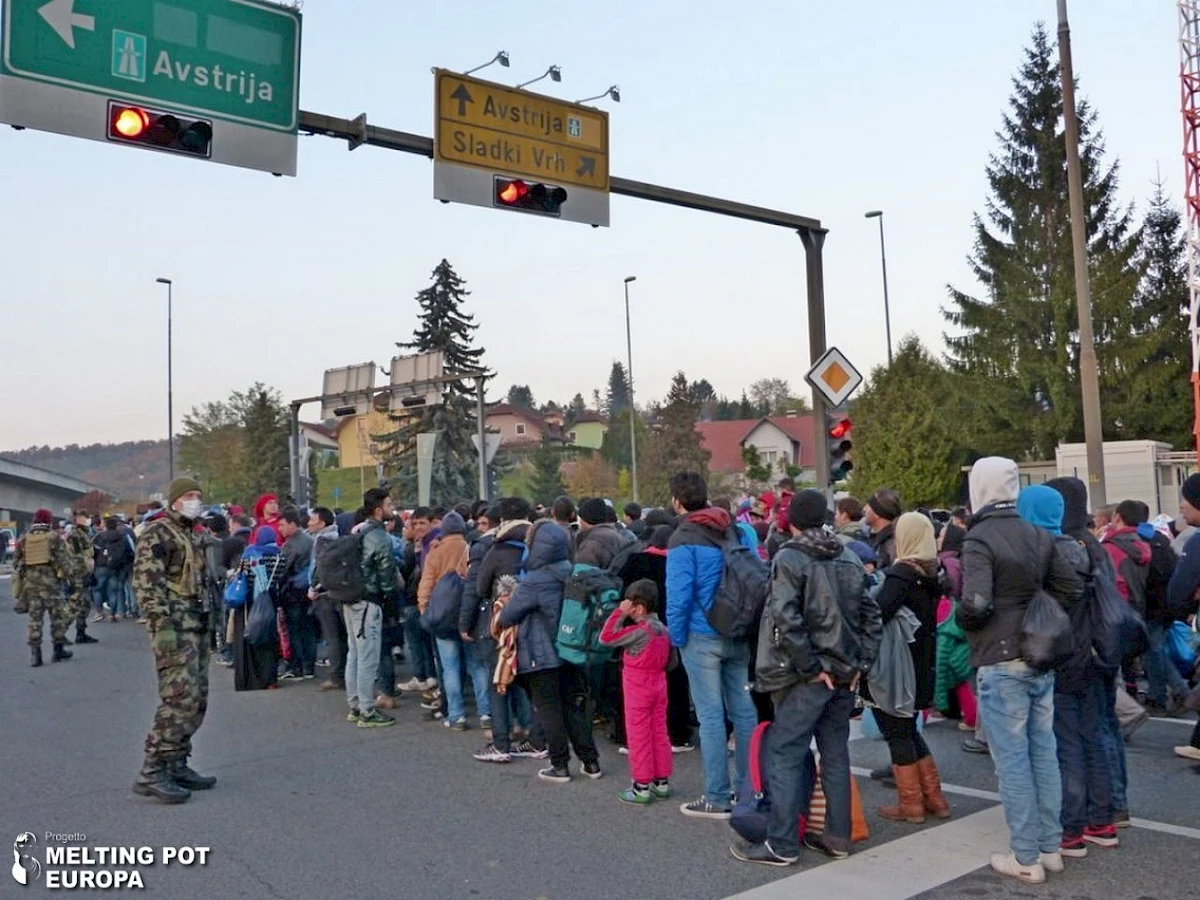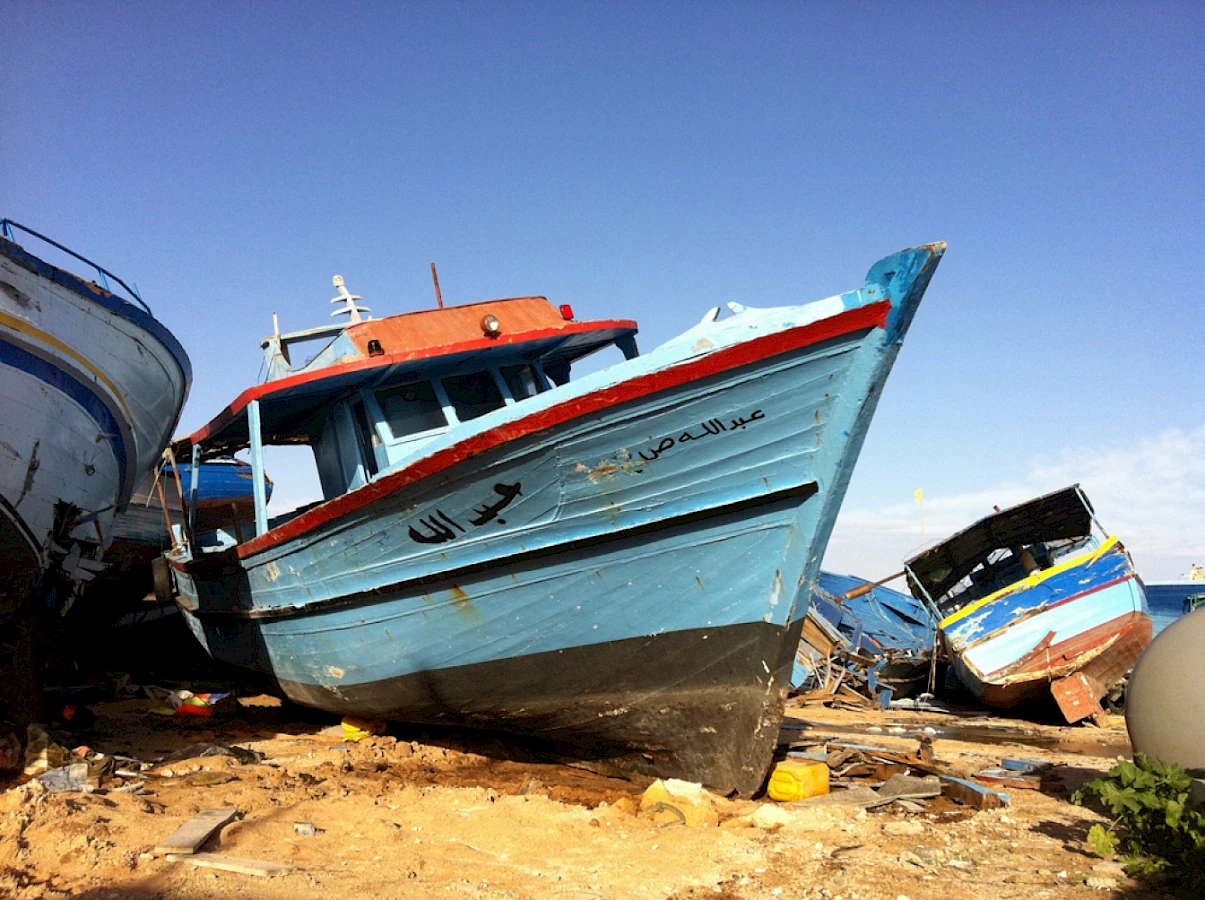The Shame and Misery of Liberal Democracy: Europe and Migration Flows

Migrants at the Slovenian-Croatian border. Photo: Carmen Sabello, Melting Pot.
Historical capitalism has become established as a dynamic structure of class domination and exploitation regarding the differential management of the workforce through its segmentation, fragmentation and attribution of different ontological statuses built primarily around race, sexuality and religious difference. The constituent power of oppressed classes and groups – systemically produced by successive and discreet sets of historically fluctuating structural devices of serialisation and subalternisation – has always stated the value equality of social subjects throughout the historically verifiable political cycles of capitalist modernity. That is to say, each systemic cycle of capital accumulation and each anti-systemic cycle of constituent antagonism, which can be verified from the sixteenth century to the present day, has always formulated proposals, across its historical arc, on the basic principle of the radical equality of human beings against the barbarism of capital and its serialised forms of domination and exploitation. This, although stuttering and inadequate, opened an epistemic, imaginary and symbolic space that would enable a critique to be traced on some of the matrices, forms and modes of expression in the design of exploitation by dominant classes and groups. The insubordination or insurgence of those groups in perpetual revolt and struggle, and the more or less elaborate and comprehensive conceptual condensing of diverse cries against domination gave theoretical and discursive thickness to the revolt of bodies, subjects and classes, and ensured that the ontological bolt of domination did not definitively slide across as a divine intent or anthropological hex. Both strategies were inherent in Western capitalism's design of domination and exploitation and bourgeois culture right through the parable mapped out by modernity. The consolidation of capitalism and the hegemony of its ruling classes has done little more than exponentially accentuate, from the nineteenth century to the present day, this systemic logic.
The revolts and struggles of subjects, classes, groups and bodies, on one side, and the fragmentary formulation of the oppression and theorising domination of a project or set of emancipatory projects, on the other, have meant that the ontologization of domination, still acknowledging the brutality of capitalism's systemic racism and its unyielding historical persistence in Western countries and their zones of colonial expansion, has not closed in a project of the masses' totalitarian subjugation. However, this trend of ontological closure is one of the systemic lines constituting liberal and bourgeois hegemony under historical capitalism, manifested, brutally and savagely, in the current migration crisis. This closure has been organised throughout history – and remains today – as a selective and strategic logic of discursive and regulatory production and as a changing design of material devices to discipline subjects and to configure life expectancies intended for and imposed upon these oppressed classes and groups, with the hope of crystallising, in the biology, the body and gnoseology and cognitive capacity, the functional needs of structural exploitation in the workforce which befit the reproduction of historical capitalism. Said in political terms, it means that the systemic organisation of poverty, exclusion and violence, conceived as ontological correlates of the inferiority of class, race and gender, historically constitutes the hard core of liberal ideology. Liberalism and the bourgeois democratic concept bound to possessive individualism constitute a discursive mechanism, enabling the logic of the ontological closure of domination to function in a selective space of exclusion of state constitution and of socioeconomic, political and cultural stratification. The parable of liberal ideology, from Locke to the current neoliberal variant, plays that double game of recording the impact of struggles against the systemic exclusion of the majorities, resulting from historical capitalism in its longue durée, in terms of legal acknowledgement of formal rights, whilst also driving forward all possible modes of management and structural recreation of the mechanisms of precariousness, exploitation and death, inclined, unremittingly, towards the ontologisation of the domination, privation and destruction of the masses. European liberal democracies are, therefore, material mechanisms which allow systemic exclusion and the ontologisation, anthropologisation and biologisation of domination to remain perfectly secured as the possibility of reprogramming the power structure of capitalism, an overt reality in the present-day management and behaviour of their systemic crisis.
The development of the migrant issue in Europe, the United States and other wealthy countries historically responds to the operation of a network of devices, running from that logic which racialises domination. The impact of regulation on Europe's borders; the application of different immigration-based legislations; the statute of second-class citizenship applied to migrants regarding that which is constitutionally in force in different countries; the labour treatment of the migrant workforce in production chains; the administrative and penal management of illegal migrants in different EU States as a dangerous population worthy of repression and/or expulsion; in addition to the statute of marginalisation suffered by the populations coming from the former colonial empires are subject to in many European countries – are all of them devices that can only work in a liberal political space, as this is established through the racial and biological ontologisation of domination inside the framework of a capitalist accumulation structure maximising the reproduction of its power as the highest criteria of social order. Current border policies, and their preservation and indiscriminate use, in the European Union – constant mechanisms of death at all access routes to Europe via the Mediterranean or the continent's different western border routes following the wars induced by Europe and the USA over the past twenty-five years in the Middle East – bear, in their design and prolongation, the implacable logic of the systemic racism of historical capitalism and the elite's penchant for the use of poverty and death as a weapon with which to discipline the masses. Furthermore, they constitute a challenge to the totality of the European liberal model's democratic pretensions, now sufficiently trampled by the "democratic" management of the economic crisis by Brussels and Germany.

Picture taken in Lampedusa almost two months after 3 October 3 2013, when during the night a Libyan boat used to transport migrants drowned a few miles from the port of Lampedusa. The shipwreck caused 368 verified deaths and about 20 people missing. It is considered one of the worst maritime disasters in the Mediterranean since the beginning of the 21st century. Photo: Melting Pot.
The migrant issue and the European Union's democratic management of it over the past two decades and, primarily, over the last years, has had another seismic effect on power, since it ushers in a criterion of incommensurateness, which reduces and debilitates the perpetually precarious balance between civilisation and barbarism, introduced into the systemic reproduction of historical capitalism by the struggles of oppressed groups. This criteria of "incommensurateness" involves familiarising those least affected by the impact of structural mechanisms of overexploitation, poverty and exclusion with highly probable logics which are highly possible for reprogramming the reproduction of European capitalist societies that truly exist. The game of liberal democracy entails, as a mass perception in the public sphere, creating an awareness of the possible gradation of the use of its devices of social constitution and logics in terms of superexploitation as they are applied just now to the migrant people in a temporary outlook on the collective perception of the possible limits of society at a given historical moment. This unfurls other effects in the constitutional and political metabolism of liberal democracies, for it obliges "national" citizens – and the set of social subjects in general – to judge their political, social and economic rights against the shadow of the brutal logic of class, over which the biologisation of exploitation has always hovered in each and every European national culture and, indeed, in the current project of European construction. The handling of the migrant issue is, therefore, the most appropriate condensing of historical capitalism's class logic, since economic exploitation is, structurally, the condensing of a whole series of sexual and racial devices and logics and the management of hardship and poverty: exploitation is subject to the imperative to maximise minorities' power in a systemic cycle of capital accumulation, for dominant classes and groups consistently build culturally, aesthetically and discursively, putting to use all possible forms, contingently, to debase the claims of justice and equality inside the framework of liberal affirmation in the search and attainment of universal justice.
The outlook of exploitation in capitalism is always the racialisation and cultural construction of inferiority in every sense, which constitutes the life and world of life of the oppressed classes. This is the definitive logic of (neo)liberalism and the democratic content which segregates the historical reproduction of its political forms. The current European populations' perception of the migrant issue works as the perfect counterpoint to degraded citizens in the making, considered in the new design of the European Union, which capitalism and its elites have secularly administered on the continent's rural, impoverished and working class populations, not to mention their colonial exportation to the rest of the world. The effect is incommensurate because the construction of the reality of domination, exploitation and poverty fundamentally takes root in the permanent production of the democratic-liberal discourse as a horizon of political construction across the whole arc of modernity and, needless to say, the present time. It is also incommensurate, leaving aside the reality of external colonialism and neocolonialism, as the situation of refugees over the past two years on the Turkey-Syria, Hungary, Balkan and Greece borders; or the situation in the banlieues and the distinctly ethno-racial actions of the French police; or the situation on the Ceuta and Melilla borders with their razor wires and rubber bullets and the shocking episode on the El Tarajal beach in the first of these Spanish cities; or Sarkozy's and Berlusconi's anti-Roma and anti-immigrant legislation; or the appearance and everyday running of organisations such as Alternative für Deutschland, Lega Nord, UKIP, Aurora Dorada, the Austrian Freedom Party, the Dutch Party for Freedom, and France's Front National – the effect is incommensurate, as these facts are so macroscopic ones that, in being confronted with the liberal rhetoric, operation and political practices of European states and the European Union, every attempt at justice, equality and right (law and right) irremediably blows up as organisational criteria in these ostensibly democratic countries. What's more, the effects of the migrant issue are incommensurate because each of these logics, episodes, and state and social behaviours trace a line and set of political dynamics, largely introjected by different European governments, who attack, head-on, democratic-liberal equilibriums from the now ailing European material constitution and erase, at a single stroke and irremediably, the possibility of building a democratic, socially committed and intelligent European project.
The excess (of the exploitation) is now the normality (of the dispossession and subalternisation). Today the dystopia of capitalism is the barbaric medicine against revolution. Only the constituent power of dominated classes and subaltern groups have, for short periods, tipped the balance of this democratic-liberal logic of poverty and annihilation, albeit at the immense and phantasmic costs of repression, war and misery. The world's misery is the misery of liberal democracy, now called the European Union in Europe. Today the world's wealth is the constituent power of its migrant, impoverished and excluded populations.
Madrid, 15 February 2017
Translated from Spanish by Neil Fawle